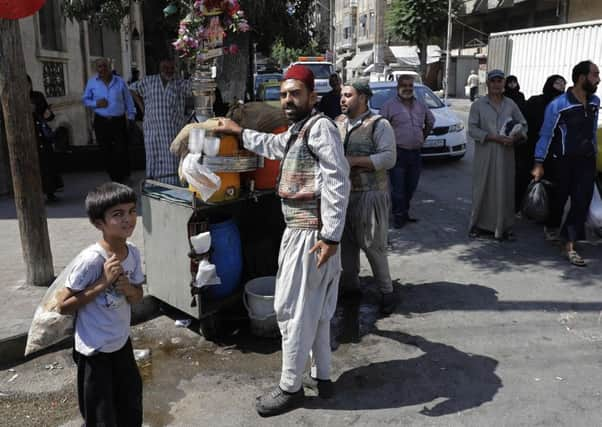Andrey Pritsepov: Russia has helped bring stability to Syria


Since then quite a lot has transpired, yet the UK media seems unaware of the fact that the situation in Syria has seen a positive change following the launch of Russia’s military operation. That makes me write again.
A brief reminder would be appropriate. Twenty months ago, after an ineffective 440-day long Western aerial campaign, the situation in Syria could not have been any worse. Conflicting parties did not talk, the Islamic State (IS)-held territories were vastly expanding, the Syrian capital Damascus was about to fall to the IS onslaught, and an acute refugee crisis in Europe was unfolding. It is against this background my country met the request of the Syrian government and agreed to send Russian air force and military advisers to help fight terrorists in Syria.
Advertisement
Hide AdAdvertisement
Hide AdAfter the first year of the Russian aerial campaign in Syria 12,000 sq km were liberated from terrorist groups, with 586 settlements and 150 cities being freed.
1500 tons of humanitarian cargo was delivered.
Back in 2016 in the IS and Al-Nusra-controlled territories the situation was critical. Residents of Aleppo – Syria’s second largest city – were trapped by the terrorists in their homes and held as a human shield against attacks.
The Russian military risked their lives to liberate 108,076 civilians, amongst them 47,183 children, and led them to safety under heavy bombardments. Several humanitarian corridors were established in order to give the residents a safe passage from ongoing hostilities. In December 2016 the Russian military negotiated the peaceful evacuation of 28,762 combatants, amongst them 691 wounded, and their family members to be transported unharmed to Idlib province. 6,490 fighters laid down their weapons following the amnesty offered by the Syrian government.
With the help of the Russian military police the city is steadily going back to normal. 16,000 families have returned to their homes in eastern Aleppo comprising more than 69,000 people, amongst them 40,000 children. In eastern districts of Aleppo only from December 2016 to February 2017 Russian field engineers de-mined 2,956 ha, 945 km of roads, 4,500 buildings (including 90 schools, four nurseries and 25 hospitals) and defused 36,000 explosive devices.
From December 2016 to April 2017 Russian doctors provided medical aid to 12,840 civilians living in villages nearby. They conducted 742 surgical operations, half of them being of a sophisticated nature. More than 25 tons of medicines and medical equipment were provided to patients.
In the last two years IS funding has been cut dramatically as a result of the Russian aerial campaign. According to our latest data, the terrorists are experiencing a sharp decline in their monthly oil revenues, that are almost halved, from $50 million more than a year ago to $12-20 million now. Russian air forces have destroyed more than 4,000 IS petrol tankers, 206 oil production facilities, 176 oil refineries and 112 oil pumping facilities.
Let’s be honest. You would never have been aware of these numbers, if you had not read this article, would you? This information is easy to find in open sources in Russia, but who reads in Russian? So the decision was made on your behalf, that it is better for you to think that this data is irrelevant and can be ignored as Russian propaganda.
Russian involvement in the Syrian conflict after almost two years of Western “strange war” has finally laid a basis for stability and dialogue. The future of Syria should be finally in the hands of the Syrian people.